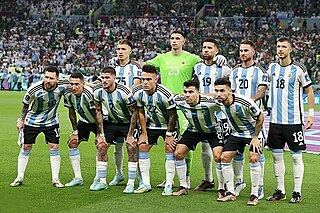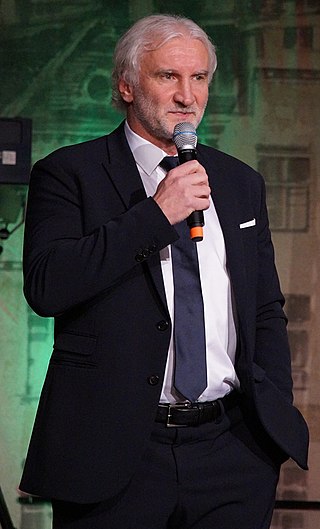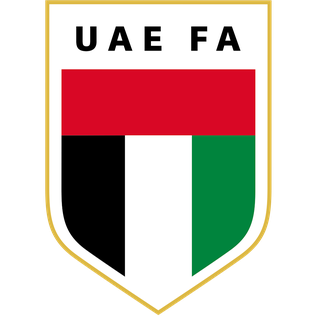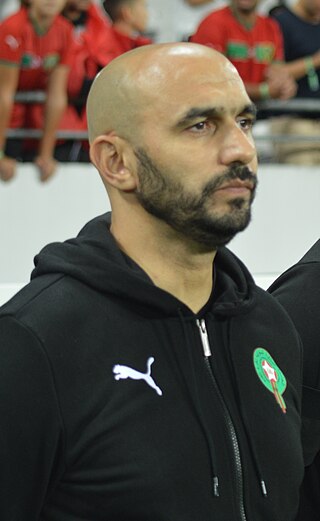
The FIFA World Cup, often called the World Cup, is an international association football competition among the senior men's national teams of the members of the Fédération Internationale de Football Association (FIFA), the sport's global governing body. The tournament has been held every four years since the inaugural tournament in 1930, with the exception of 1942 and 1946 due to the Second World War. The reigning champions are Argentina, who won their third title at the 2022 tournament.

Franz Anton Beckenbauer was a German professional football player, manager, and official. Nicknamed der Kaiser, he is widely regarded as one of the greatest players of all time, and is one of nine players to have won the FIFA World Cup, the European Champions Cup, and the Ballon d'Or. Beckenbauer was a versatile player who started out as a midfielder, but made his name as a central defender. He is often credited as having invented the role of the modern sweeper.

The France national football team represents France in men's international football. It is controlled by the French Football Federation, the governing body for football in France. It is a member of UEFA in Europe and FIFA in global competitions. The team's colours and imagery reference two national symbols: the French blue-white-red tricolour and Gallic rooster. The team is colloquially known as Les Bleus. They play home matches at the Stade de France in Saint-Denis and train at Centre National du Football in Clairefontaine-en-Yvelines.

Rudolf "Rudi" Völler is a German professional football manager and former player, who is currently the director of the Germany national team. In Germany, he is nicknamed "Tante Käthe", a name bestowed upon him by Thomas Berthold, and in Italy, he is nicknamed "Il tedesco volante" by supporters of Roma.

Didier Claude Deschamps is a French professional football manager and former player who has been managing the France national team since 2012. He played as a defensive midfielder for several clubs, in France, Italy, England and Spain, namely Marseille, Juventus, Chelsea and Valencia, as well as Nantes and Bordeaux. Nicknamed "the water-carrier", Deschamps was an intelligent and hard-working defensive midfielder who excelled at winning back possession and subsequently starting attacking plays, and also stood out for his leadership throughout his career. As a French international, he was capped on 103 occasions and took part at three UEFA European Football Championships and one FIFA World Cup, captaining his nation to victories in the 1998 World Cup and Euro 2000.

Mário Jorge Lobo Zagallo was a Brazilian professional football player, coordinator and manager, who played as a forward.

Carlos Alberto Gomes Parreira is a Brazilian former football manager who holds the record for attending the most FIFA World Cup final tournaments as manager with six appearances. He also managed five different national teams in five editions of the FIFA World Cup. He managed Brazil to victory at the 1994 World Cup, the 2004 Copa América, and the 2005 Confederations Cup. He is also the only manager to have led two different Asian teams to conquer the AFC Asian Cup.

The United Arab Emirates national football team represents United Arab Emirates in international football and serves under the auspices of the country's Football Association.
As of the 2022 FIFA World Cup, 80 national teams have competed at the finals of the FIFA World Cup. Brazil is the only team to have appeared in all 22 tournaments to date, with Germany having participated in 20, Italy and Argentina in 18 and Mexico in 17. Eight nations have won the tournament. The inaugural winners in 1930 were Uruguay; the current champions are Argentina. The most successful nation is Brazil, which has won the cup on five occasions. Five teams have appeared in FIFA World Cup finals without winning, while twelve more have appeared in the semi-finals.

World Soccer is an English-language football magazine, published by Kelsey Media. The magazine was established in 1960 and is the oldest continually published football magazine in the United Kingdom. It specialises in the international football scene. Its regular contributing writers include Brian Glanville, Keir Radnedge, Sid Lowe, Tim Vickery, and Henry Winter. World Soccer is a member of the European Sports Media (ESM), an umbrella group of similar magazines printed in other languages. The members of this group elect a European "Team of the Month" and a European "Team of the Year".

Lionel Sebastián Scaloni is an Argentine professional football manager and former player who is the current manager of the Argentina national team. Under his leadership, Argentina achieved the 2022 FIFA World Cup. Scaloni is regarded as one of the best men’s national coaches in the world. A versatile player, he operated as a right-back or right midfielder.

Walid Regragui, sometimes known as Hoalid or Oualid Regragui, is a French born Moroccan professional football manager and former player who played as a right-back. He is the head coach of the Morocco national team. He made history when he led the team to the semi-finals of the FIFA World Cup 2022, the first African nation to do so.

Alberto Horacio Suppici was a Uruguayan footballer and coach who won the first ever FIFA World Cup, leading the Uruguay team in the 1930 tournament on home soil. Suppici is known as el Profesor. His cousin was the professional driver Héctor Suppici Sedes.

Benoît Guy Robert "Ben" Costil is a French professional footballer who plays as a goalkeeper.

This is a record of Argentina's results at the FIFA World Cup. Argentina is one of the most successful teams in the tournament's history, having won three World Cups: in 1978, 1986, and 2022. Argentina has also been runner-up three times: in 1930, 1990 and 2014. In 18 World Cup tournaments, Argentina has 47 victories in 88 matches. The team was present in all but four of the World Cups, being behind only Brazil and Germany in number of appearances.

The 1970 FIFA World Cup final was held on Sunday, 21 June, in the Estadio Azteca in Mexico City, to determine the winner of the 1970 FIFA World Cup. This final, between Brazil and Italy, marked the first time that two former world champions met in a final; Italy had previously won the World Cup in 1934 and 1938, while Brazil won in 1958 and 1962.

The IFFHS World's Best National Coach is an association football award given annually, since 1996, to the most outstanding national team coach as voted by the International Federation of Football History & Statistics (IFFHS). The votes, in 1996, were cast by IFFHS's editorial staff as well as experts from 89 countries spanning six different continents. Since then, the votes are now awarded by 81 experts and selected editorial offices from all the continents. In 2020, an award for women's national team coaches was introduced. The current men's recipient is Argentina coach Lionel Scaloni. The current women's recipient is the England manager Sarina Wiegman.
The 2022 FIFA World Cup final was the final match of the 2022 FIFA World Cup, the 22nd edition of FIFA's competition for men's national football teams. The match was played at Lusail Stadium in Lusail, Qatar, on 18 December 2022, the Qatari National Day, and was contested by Argentina and defending champions France. With a record 1.5 billion people watching on television, the final became one of the most widely watched televised sporting events in history.



















